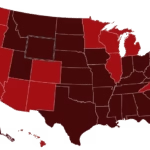Thousands of Haitian nationals residing in Ohio, who were previously shielded by Temporary Protected Status (TPS), now confront a stark choice: face continuous deportation pressure from President Trump’s administration or return to their homeland, which is currently overwhelmed by multiple devastating crises.
Many assert that going back to Haiti in the present circumstances would be equivalent to “signing their own death warrant.”
The Trump administration, through Homeland Security Secretary Kristi Noem, has declared the definitive termination of the TPS program for Haitians. “TPS will officially expire on August 3, and protections will be lifted on September 2.” This decision revokes an extension previously granted under the Biden administration, which was set to continue until 2026. A federal judge in a New York district court has ruled that the Trump administration must first conduct a thorough evaluation of Haiti’s security situation before ending TPS for Haitians.
In Columbus, where roughly 30,000 Haitians reside, the news has created widespread panic within the community. Jean Manuel, a local business owner and community activist, believes the situation in Haiti has become so perilous that “the only option is to flee to another safe country, like Canada or Mexico.” However, this alternative comes with its own challenges, according to USA Today, which published an in-depth report on Ohio’s Haitian population.
“To immigrate legally to Canada, you need to have family who can take you in, and many of our people simply don’t,” said Vilés Dorsainvil, who heads the Haitian Community Help Center in Springfield, a city where nearly 30% of its 60,000 residents are Haitian immigrants.
The Department of Homeland Security maintains that Haiti no longer qualifies as a country in crisis. TPS is designated for nations experiencing war, natural disasters, or other extraordinary temporary conditions.
However, this assessment faces strong opposition from those with direct knowledge of the situation.
“Every neighborhood is controlled by a gang. They burn homes, kill children, and empty entire communities,” testified Jean Manuel. “Is that the life we’re proposing to them? That’s a death sentence,” he told USA Today.
Ohio’s Republican Governor Mike DeWine has publicly voiced his opposition to Washington’s decision, extending his support to his state’s Haitian community. “Haiti is one of the most dangerous places on earth. Things have gotten even worse,” he said to the Statehouse News Bureau.
During a visit to Springfield—where the Haitian community has encountered hostility fueled by political misinformation, including from then-candidate Donald Trump and his running mate J.D. Vance—DeWine highlighted the economic impact of Haitian immigrants.
“Businesses have told me plainly: without the Haitians, we couldn’t keep the factories running. They’re doing the hard work others won’t do,” he stated, according to USA Today.
Since President Trump’s February announcement ending TPS, the repercussions have been immediate. According to Manuel and Dorsainvil, numerous employers have begun reluctantly terminating Haitian workers from their positions.
With uncertainty surrounding their future immigration status, employers are showing hesitation in maintaining a workforce marked for eventual removal. Many Haitian families are now experiencing difficulties meeting basic needs like food and housing costs.
“These are people who just want to work, raise their children in peace, and contribute,” Manuel stressed. “They’re not criminals.”
Multiple immigrant advocacy groups have denounced President Trump’s decision to end TPS for Haitians, labeling it as “inhumane.”
As it stands, TPS is set to terminate on February 2, 2026—barring intervention from a higher court.
The Trump administration has made clear its plans to challenge the federal judge’s ruling from New York’s district court.
Similar to his previous term, there are strong indications that this legal battle will extend through the remainder of President Trump’s current presidency.
In 2017, he previously attempted to terminate TPS for Haitian immigrants. A federal judge ruled in the beneficiaries’ favor. The government pursued an appeal, and the case continued until Trump’s term concluded. The appeal was subsequently withdrawn when Biden took office.







